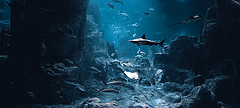- About
- Topics
- Story
- In-Depth
- Picks
- Opinion
- News
- Donate
- Signup for our newsletterOur Editors' Best Picks.Send
Read, Debate: Engage.
With rising demand for metals for emerging economies and for technologies such as hybrid cars and smartphones, the ocean bed is the latest frontier opening up for the mining industry. The oceans which make up 45% of the earth's surface are already degraded by overfishing, industrial waste, plastic debris and climate change, causing irreparable damage to their chemistry and the marine ecosystem. Now comes a new extractive industry and scientists say governments are simply not prepared.
ISA, a UN body responsible for the seabed has already issued 26 exploration contracts covering a total area the size of Mexico. This activity raises a number of environmental, legal and economic challenges for the ISA and its 166 member states, the most immediate of which is environmental. The deep ocean below 200m is the largest habitat for life on earth and supports more than a thousand species at a single site, according to one study.
The core content of copper, manganese, cobalt and rare earths strewn across the ocean floor 10 times greater than the richest seams on land and as the price of these metals rise, the cost of their retrieval from the extreme depths has become extremely attractive to corporations.
But the stakes have never been higher.
Though extraction will not require drilling we remain largely ignorant of how deep ocean ecosystems change in response to human activities and natural variations and the results of these changes. Waste disposal from mining activities is a major concern for scientists. Sylvia Earle, an oceanographer says, “Mining is possible but the 20,000ft question is what do you do with the tailings? All of the proposals involved dumping the tailings at sea with profound impacts on the water column and the sea floor below”.
Another major factor to consider is that the oceans are becoming increasingly important to global food security; up to three billion people rely on the sea for a large share of their protein, especially in the developing world. That demand is only expected to grow.
José María Figueres, a former president of Costa Rica and co-chair with the former British foreign secretary, David Miliband, of the Global Ocean Commission, an independent entity charged with developing ideas for ocean reform, says, "Do we understand enough about the interconnection between the seabed, the column of water, the 50% of the oxygen that the ocean produces for the world, the 25% of the carbon that it fixes in order to go in and disrupt the seabed in a way that we would if we went in and started mining? I don't think so, not until we have scientific backing to determine whether this is something good or bad for the planet.”
Avaaz, the online activist network says, "right now, the ISA is accepting public comments on a set of rules that will govern this great ocean sell-off for years to come". Have your say on Avaaz.
